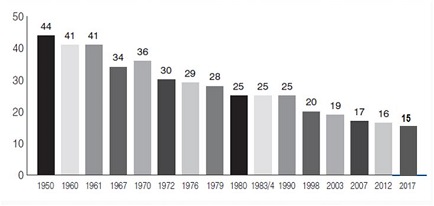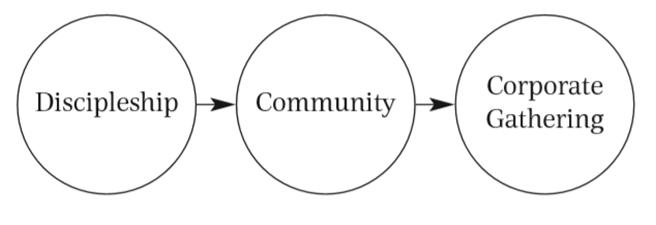Because we behave as we believe, our worldview guides and informs our decisions and actions. Sometimes our view brings clarity, and at other times it can distort reality. A seemingly rational worldview can be true, partially true, or entirely false.
Today the church operates from the belief that a strong corporate gathering (as well as other programs) is the place to bridge the gap with those who do not yet have a relationship with Jesus. With that as our central focus we then use small communities/groups to keep those people connected to the church as well as funnel them into ministry participation.
This method has been used for a long time now so we should stop and have a look at how successful it has been. Let’s do that by looking at church attendance figures for Australia from 1950 until the last national census (the same tendency is evident in most western countries). We may be largely unaware of this statistic due to the emergence and notoriety of fast-growing mega-churches but, despite the existence of these large churches, overall church attendance in the west is steadily declining.

When this approach becomes more attractional it typically appeals to the needs or desires of those it is targeting and must deliver those needs and desires at a “price” the target group is willing to pay. If a person “buys into” this form of Christianity have they been allowed to be a Christian without being a disciple? My question: Is this religious consumerism? Dallas Willard calls it the “cost of non-discipleship”.
If on the other hand we go back to the first century people encountered Jesus at the side of wells, in cemeteries, in the country, in homes, on hill-sides or walking from town to town. From there they moved into small communities/groups. This way of connecting continued on for another few centuries and below is one author’s view of the results of this approach.

It wasn’t until the end of the forth centaury that we see a more institutional approach of Christianity that has effected our current view. I am not suggesting that Christ-followers should not meet together and grow together and worship together. But what I am saying is that for too long now we have been viewing things through institutional lenses to the point where we believe that disciples need the ‘institution’ more than they need a direct, close, Spirit-led relationship with Jesus.
The following diagrams expand on what I am saying here and show a different way of looking at discipleship as it relates to the essential aspects of a disciple’s life.

When Jesus began His ministry, His starting point was to make disciples. As these disciples grew in number they formed into small communities. Later in the history of the church, larger corporate gatherings and buildings began to play a bigger role.
Even though all three groupings have been a part of the historical development of the church, I believe Jesus had a reason for moving outside of the structured religious norm to begin something fresh and new. He established a pattern of making disciples who made other disciples, setting in place the potential for unlimited growth of His church worldwide. Disciples were grouped as the need arose and out of the rapid growth grew different forms of corporate gathering.

I couldn’t agree with you more Colin. 18 months ago I had the privilege to lead my brother-in-law to Christ. He had never been to church and didn’t go for quite a while until he was established in his walk with Jesus. We simply read lots of the word together, prayed together and experimented with obedient steps of faith in direct obedience to Jesus, where Jesus showed up in his life. We discussed what Jesus was saying to him on a regular basis, etc.. After several months he knew Jesus personally and he finally attended a church and fitted right into corporate worship and was baptised shortly after.
Two weeks ago (1 year after he was baptised) he saw his first disciple get baptised (someone from his workplace) and another believer at the baptism said to this new baptisee, “Which church do you go to, for I haven’t seen you here before.” He replied to her, leaving her in shock, “I’ve never been to church before.” But here is the kicker. He said, “I am now a believer, and I’m being baptised because Jesus demands if of me, and am looking to commit to a church as Jesus commands me to from what the Bible teaches; one that needs me the most, where I can make a difference.
Another friend of my brother-in-law (one of his best friends from when he attended school) has also just come to Christ. He was reading lots of the Bible with him and simply walking with him while expecting Jesus to show up (like we did together) – and Jesus did in some amazing ways. This new convert started to look for a church to attend. He told my brother-in-law that he wants to find a church where he can truly serve and make a difference. He is not baptised yet, but it is only a matter of time. He has visited a number of churches and the one question he is asking, “Where can I fit in best here to assist?” If it is too polished, he can’t see himself fitting in there, and tries another (opposite of consumerism).
I don’t see these two similar responses as coincidences. They both grew in Christ by getting to know Him first through the word and His Spirit and by walking with another passionate believer. Once coming to Jesus, they were never going to be consumers. It just didn’t even filter into their thinking.
The other blessing of this story is that both my newly converted brother-in-law and my sister, whom I also recently led to Christ, are discipling a number of new seekers each. And the small church they are a part of can’t work out what is going on – they also can’t work out why they aren’t bringing their friends straight to church. But my sister and her husband are Biblically literate enough know that the church is made up of the body of believers and that bringing seekers is not meant to be the mainstay for bringing people to Jesus (no wonder we have so much consumerism in the church). They are playing the long-game, and I’m thoroughly enjoying walking with them and protecting them from the unhelpful expectations of consumerism that has infiltrated most churches.
Thanks Dave. It takes courage to step outside of the current paradigm of church but the rewards for the Kingdom are worth it. It is also rewarding (and fun) to see Jesus at work when we are obedient to His mission to make disciples.